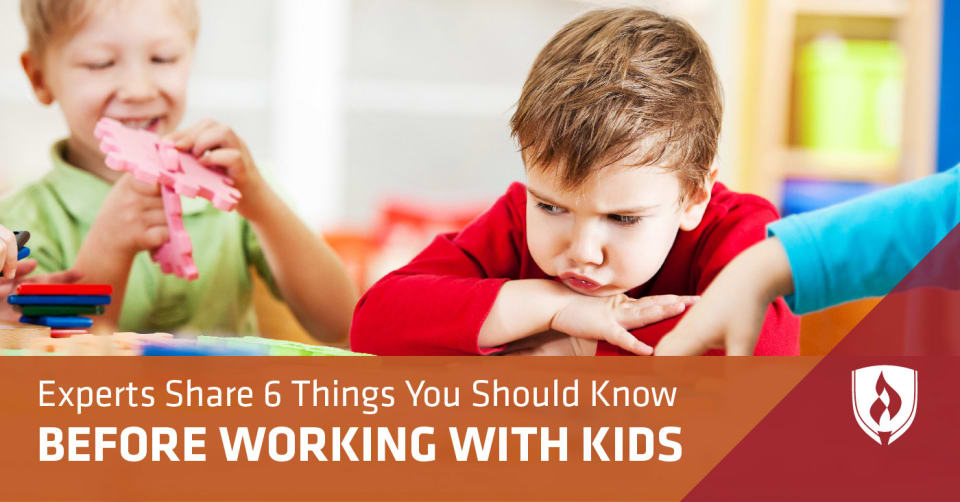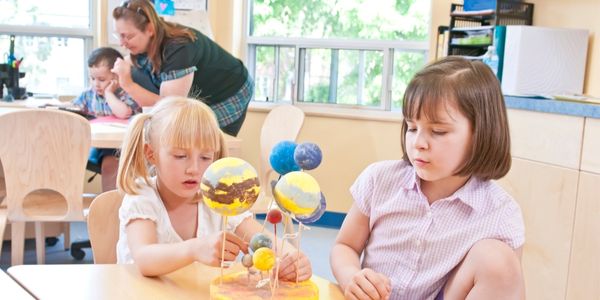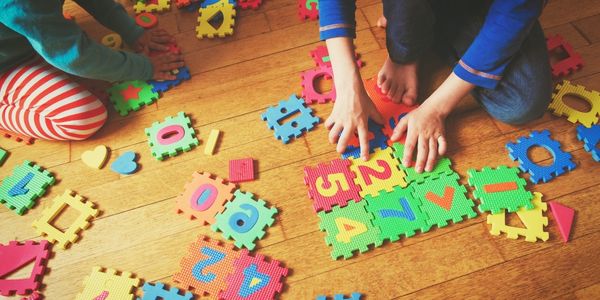
You’ve always loved children, and the feeling is mutual. Kids are drawn to you like magnets no matter where you go, from your family reunion to the kids in your neighborhood. Now that it’s time to make a career decision, working with kids is definitely on your radar.
There are plenty of options for working with kids—teachers and child development experts, childcare providers and nannies, pediatricians and child life specialists are just some of the professionals who have dedicated their careers to helping society’s youngest members. But there’s a big difference between babysitting and planning your entire career around children. How can you know if working with kids is right for you?
Working with kids can be rewarding, but it’s true that not everyone is the best fit for these careers. We rounded up six things you should know about working with kids from experts who have been there so you can decide if you’re up to the task of this career path.
6 Things to remember about working with kids
When it comes to working with children, you’ll never be prepared for everything. But there are a few pieces of advice the experts have that can help you thrive. Hear what they have to say.
1. Expect the unexpected
Kids are unpredictable. The only guarantee is that you never know what they might throw at you. Professionals who work with kids need to be ready to handle unexpected situations and the emotional ups and downs that come with them. “Working with kids has taken me to emotional extremes. I've been so happy that I've cried for no reason and so frustrated that I felt like a failure,” says Elizabeth Malson, president of the nanny training program The Amslee Institute.
Youth workers who can stay flexible will be able to roll with the punches better than those who hold tightly to a perfect plan. “One must be flexible, quick thinking and prepared to adjust suddenly when working with children,” says Dr. John DeGarmo, founder and director of The Foster Care Institute.
2. No two children are exactly the same
You might think that once you choose a career working with kids, you’ll be trained in one right way to do things. That method will only lead to frustration, however. “Each child is different and unique, and thus, each child requires a unique way to work with them, guide them, teach them and even discipline them,” DeGarmo says.
Any professional who works with children, from pediatricians to teachers, must be fully prepared to change strategies if something isn’t working for a particular child. “I wish I had learned from the outset that there is no one set way or pattern to working with children,” DeGarmo says. Professionals who work with kids need to learn a variety of techniques, so they’re always prepared to support each child in the way that’s most helpful to them.
3. Kids are active
Sometimes there’s a perception that children who can’t sit still are “wild” or affected by a hyperactivity disorder, but the truth is that all kids are active—and that’s exactly how it should be. Experiential family therapist Katie Ziskind wishes she had understood just how active kids were before she began working with them.
“Play therapy and movement-based therapies are the only ways I work with kids in therapy because their brains aren’t ready to talk it out like adults,” Ziskind says. “They are active, and I’m reminding parents that active children are healthy.” Those who are interested in working with kids should be able to embrace children’s constant motion and use this activity to offer support and learning opportunities.
4. Be prepared for difficult situations
Children are some of the most vulnerable members of society, and that means those who work with them will often have to witness difficult or heartbreaking situations. “One of the hardest things about working with kids includes witnessing the effects of abuse and adverse childhood experiences,” says Sandi Lindgren, a clinical social worker, author and professional life coach. DeGarmo agrees, noting that some children bring with them anxieties and traumas that professionals are often unprepared to handle.
Those who work with children aren’t always able to prevent these situations from occurring, but they are in a position to help. Lindgren recommends that anyone working with kids be trained in trauma response so they’re fully prepared to advocate for and support both children and themselves.
5. Don’t expect instant gratification
You’ve probably seen a heartwarming TV show, or even a commercial, where a teacher or coach steps in and offers the emotional support and resources a child needs. The music swells and the child’s life is immediately changed. It’s a beautiful picture, but it’s not always realistic.
“Working with kids does not bring with it instant gratification. It takes time and effort to help children learn or change behavior,” says school psychologist, former principal and parent coach Dr. Ari Yares. It’s true that those who work with children can make a huge difference in their lives, but don’t expect this change to happen magically overnight. Setting realistic goals and expectations can help those who work with kids from experiencing frustration and burnout.
6. Working with kids can bring incredible joy
No matter how difficult working with kids can be, our experts agree that the greatest reward is being able to see a child’s joy. All that hard work pays off when a teacher sees a student’s eyes light up as he understands a tricky concept, or when a physical therapist watches a child beam with pride after taking her first steps following an injury. Being this source of encouragement for kids is often one of the most rewarding parts of the job.
It’s not always the adults who are teaching life lessons. Kids can turn the tables and offer joy and learning experiences to the grown-ups in their lives. “Working with children is a lifelong learning experience, as I am able to discover new ways of thinking and looking at things through a child's perspective,” DeGarmo says. “Each child has made me a better person, and I have learned something from each, as well.”
Nurturing the next generation
Working with kids isn’t for everyone, but it can be a gratifying career if you have the heart and the skill set to nurture the next generation. There are plenty of career options that allow you to work with kids, including child development. Find out if this career path could be right for you by reading up on these 6 Signs You Should Consider a Career in Child Development.
Related Articles:




